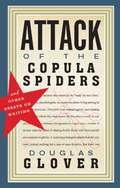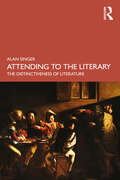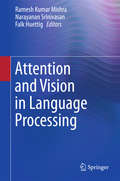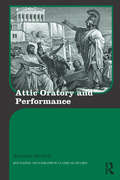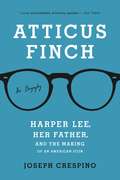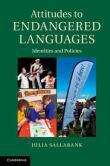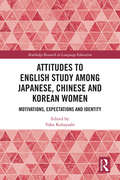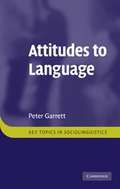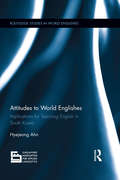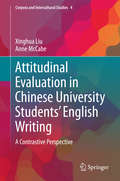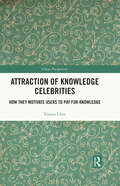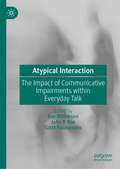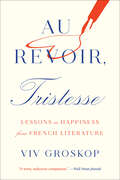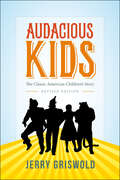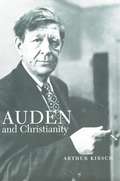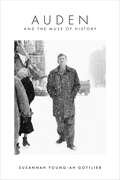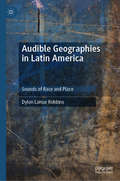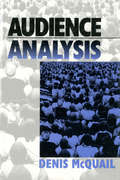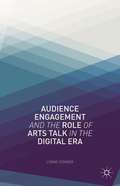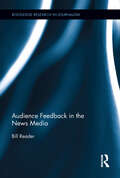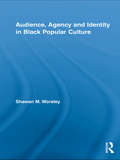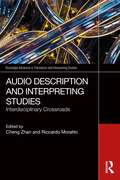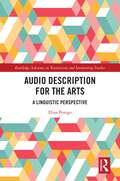- Table View
- List View
Attack of the Copula Spiders
by Douglas GloverA GLOBE & MAIL BEST BOOK OF THE YEAR FOR 2012 "Glover is a master of narrative structure."-Wall Street Journal" In the tradition of E.M. Forster, John Gardner, and James Wood, Douglas Glover has produced a book on writing at once erudite, anecdotal, instructive, and amusing. Attack of the Copula Spiders represents the accumulated wisdom of a remarkable literary career: novelist, short story writer, essayist, teacher and mentor, Glover has for decades been asking the vital questions. How does the way we read influence the way we write? What do craft books fail to teach aspiring writers about theme, about plot and subplot, about constructing point of view? How can we maintain drama on the level of the sentence-and explain drama in the sentences of others? What is the relationship of form and art? How do you make words live?Whether his subject is Alice Munro, Cervantes, or the creative writing classroom, Glover's take is frank and fresh, demonstrating again and again that graceful writers must first be strong readers. This collection is a call-to-arms for all lovers of English, and Attack of the Copula Spiders our best defense against the assaults of a post-literate age.Douglas Glover is the award-winning author of five story collections, four novels, and two works of non-fiction. He is currently on the faculty of the Vermont College of Fine Arts MFA in Writing program.Praise for Douglas Glover"So sharp, so evocative, that the reader sees well beyond the tissue of words into ... the author's poetic grace." - The New Yorker"Glover invents his own assembly of critical approaches and theories that is eclectic, personal, scholarly, and smart ... a direction for future literary criticism to take." - The Denver Quarterly"A ribald, raunchy wit with a talent for searing self-investigation." - The Globe and Mail"Knotty, intelligent, often raucously funny." - Maclean's"Passionately intricate." - The Chicago Tribune"Darkly humorous, simultaneously restless and relentless." - Kirkus Reviews
Attending to the Literary: The Distinctiveness of Literature
by Alan SingerAttending to the Literary: The Distinctiveness of Literature is a foray into current debates about the nature of the literary. What is literary? Is literarity a thing? Are there still aesthetic standards of taste? Is the category of literary aesthetics an obstacle to understanding the uses of literature? What does it mean to count the reading of literature as an experience in its own right? What would be the deficits to human experience without literature? Attending to the Literary addresses all of these questions with a view to challenging the notion of literarity as merely representative of experience. On the contrary, Alan Singer shows how literarity is an enacting of experience. Through close readings of an eclectic repertoire of literary sentences – culled from the genres of fiction, poetry, and drama – Singer demonstrates how syntax stages human capacities for attending ever more consequentially to the world of practical experience. These stagings of forms of attention involve readers in the drama of reason-giving and expand the possibilities of rational imagination. Attending to the Literary speaks to a broad audience of readers for whom the question "Does literature matter?" remains an urgent intellectual challenge.
Attention and Vision in Language Processing
by Ramesh Kumar Mishra Narayanan Srinivasan Falk HuettigThis volume provides a comprehensive overview of the nature of attentional and visual processes involved in language comprehension. Key concerns include how linguistic and non-linguistic processes jointly determine language comprehension and production and how the linguistic system interfaces with perceptual systems and attention. Language scientists have traditionally considered language in isolation from other cognitive and perceptual systems such as attention, vision and memory. In recent years, however, it has become increasingly clear that language comprehension must be studied within interaction contexts. The study of multimodal interactions and attentional processes during language processing has thus become an important theoretical focus that guides many research programs in psycholinguistics and related fields.
Attic Oratory and Performance (Routledge Monographs in Classical Studies)
by Andreas SerafimIn a society where public speech was integral to the decision-making process, and where all affairs pertaining to the community were the subject of democratic debate, the communication between the speaker and his audience in the public forum, whether the law-court or the Assembly, cannot be separated from the notion of performance. Attic Oratory and Performance seeks to make modern Performance Studies productive for, and so make a significant contribution to, the understanding of Greek oratory. Although quite a lot of ink has been spilt over the performance dimension of oratory, the focus of nearly all of the scholarship in this area has been relatively narrow, understanding performance as only encompassing 'delivery' – the use of gestures and vocal ploys – and the convergences and divergences between oratory and theatre. Serafim seeks to move beyond this relatively narrow focus to offer a holistic perspective on performance and oratory. Using examples from selected forensic speeches, in particular four interconnected speeches by Aeschines (2, 3) and Demosthenes (18, 19), he argues that oratorical performance encompassed subtle communication between the speaker and the audience beyond mere delivery, and that the surviving texts offer numerous glimpses of the performative dimension of these speeches, and their links to contemporary theatre.
Atticus Finch: The Biography
by Joseph CrespinoWho was the real Atticus Finch? A prize-winning historian reveals the man behind the legend The publication of Go Set a Watchman in 2015 forever changed how we think about Atticus Finch. Once seen as a paragon of decency, he was reduced to a small-town racist. How are we to understand this transformation? In Atticus Finch, historian Joseph Crespino draws on exclusive sources to reveal how Harper Lee's father provided the central inspiration for each of her books. A lawyer and newspaperman, A. C. Lee was a principled opponent of mob rule, yet he was also a racial paternalist. Harper Lee created the Atticus of Watchman out of the ambivalence she felt toward white southerners like him. But when a militant segregationist movement arose that mocked his values, she revised the character in To Kill a Mockingbird to defend her father and to remind the South of its best traditions. A story of family and literature amid the upheavals of the twentieth century, Atticus Finch is essential to understanding Harper Lee, her novels, and her times.
Attitude Reports (Key Topics in Semantics and Pragmatics)
by Thomas GranoPropositional attitude reports are sentences built around clause-embedding psychological verbs, like Kim believes that it's raining or Kim wants it to rain. These interact in many intricate ways with a wide variety of semantically relevant grammatical phenomena, and represent one of the most important topics at the interface of linguistics and philosophy, as their study provides insight into foundational questions about meaning. This book provides a bird's-eye overview of the grammar of propositional attitude reports, synthesizing the key facts, theories, and open problems in their analysis. Couched in the theoretical framework of generative grammar and compositional truth-conditional semantics, it places emphasis on points of intersection between propositional attitude reports and other important topics in semantic and syntactic theory. With discussion points, suggestions for further reading and a useful guide to symbols and conventions, it will be welcomed by students and researchers wishing to explore this fertile area of study.
Attitudes to Endangered Languages
by Julia SallabankLanguage attitudes and ideologies are of key importance in assessing the chances of success of revitalisation efforts for endangered languages. However, few book-length studies relate attitudes to language policies, or address the changing attitudes of non-speakers and the motivations of members of language movements. Through a combination of ethnographic research and quantitative surveys, this book presents an in-depth study of revitalisation efforts for indigenous languages in three small islands round the British Isles. The author identifies and confronts key issues commonly faced by practitioners and researchers working in small language communities with little institutional support. This book explores the complex relationship of ideologies, identity and language-related beliefs and practices, and examines the implications of these factors for language revitalisation measures. Essential reading for researchers interested in language endangerment and revitalisation, sociolinguistics, linguistic anthropology and language policy and planning, as well as language planners and campaigners.
Attitudes to English Study among Japanese, Chinese and Korean Women: Motivations, Expectations and Identity (Routledge Research in Language Education)
by Yoko KobayashiThis edited book comprises chapters integrated around a central theme on college-educated Japanese, Korean, and Chinese women’s orientation to English study. The collection is composed of two parts: (1) East Asian women’s motivation to study in the West and (2) East Asian women’s dream to use English as a career. The first part discusses their international migration as facilitated by factors characteristic of East Asian nations (e.g. middle-class women’s access to advanced education and yet unequal access to professional career) and other factors inherent in each nation (e.g. different social evaluations of women equipped with competitive overseas degrees and English proficiency). The second part sheds light on the dreams and realities of East Asian female adults who, having been avid English learners, aim for "dream jobs" (e.g. interpreters) or have few other career choices but to be re-trained as English specialists or even as Japanese language teachers working abroad. This collection is suitable for any scholar interested in the lives and voices of young educated women who strive to empower themselves with language skills in the seemingly promising neoliberal world that is, however, riddled with ideological contradictions.
Attitudes to Language
by Peter GarrettJust about everyone seems to have views about language. Language attitudes and language ideologies permeate our daily lives. Our competence, intelligence, friendliness, trustworthiness, social status, group memberships, and so on, are often judged from the way we communicate. Even the speed at which we speak can evoke reactions. And we often try to anticipate such judgements as we communicate. In this lively introduction, Peter Garrett draws upon research carried out over recent decades in order to discuss such attitudes and the implications they have for our use of language, for social advantage or discrimination, and for social identity. Using a range of examples that includes punctuation, words, grammar, pronunciation, accents, dialects and languages, this book explores the intricate and fascinating ways in which language influences our everyday thoughts, feelings and behaviour.
Attitudes to World Englishes: Implications for teaching English in South Korea (Routledge Studies in World Englishes)
by Hyejeong AhnThis book critically examines South Korean English teachers’ awareness of and attitude towards eight varieties of English and how they respond to the proposal of a World Englishes approach in their teaching practice. It showcases the deeply rooted favouritism towards American English and illustrates how relevant challenges arising from this attitude can be addressed to meet the changing needs of future participants in international contexts. This book argues that disclosing and questioning the hidden discursive practices embedded in the English education policy in South Korea may be the first step in raising awareness of and in changing negative attitudes towards embracing diversified Englishes. The findings are systemically discussed in relation to the implications that researching awareness and attitude has for pedagogical considerations and for teacher training. This book aims to contribute to the field of WE, where studies relating to the South Korean context are largely limited.
Attitudinal Evaluation in Chinese University Students’ English Writing: A Contrastive Perspective (Corpora and Intercultural Studies #4)
by Xinghua Liu Anne MccabeThis book offers up-to-date insights into the long-standing controversy of whether or not Chinese learners of English adequately express their attitudes in written English. It compares four writing datasets from three groups of student writers (e. g. , English-speaking students' English texts, Chinese-speaking students' Chinese texts, and both English and Chinese texts produced by the same group of Chinese-speaking students majoring in English), and applies the appraisal framework, an analytical tool developed in the field of Systemic Functional Linguistics. The book provides a nuanced view of the deployment of attitudinal patterns and the linguistic resources used for attitudinal evaluation in Chinese students' English writing. Accordingly, it offers a valuable resource for all those interested in second language writing, contrastive rhetoric, second language acquisition and systemic functional linguistics.
Attorney by Day, Novelist by Night: Bring Your Book to Light While Still Practicing Law
by Kim BenjaminAn inspiring guide for lawyers—or any busy professionals—who want to pursue their literary dreams. Are you an attorney working hard, sixty-plus-hour weeks to right the wrongdoings of the world? Are you enjoying a successful legal career, but still not wholly satisfied? Have you dreamed of exploring your creative side and following in the footsteps of John Grisham, Scott Turow, Marcia Clark, Robert Dugoni, and the countless other lawyers who have channeled their talent and unique experience into literary success? It&’s no surprise that many in the legal profession feel the desire to write, as they deal every day with the subtleties of language in their work—and encounter plenty of conflict and drama to provide creative inspiration. This helpful, supportive guide shows how they can indulge their dreams, pursue their passion, and find greater fulfillment—without abandoning their career.
Attraction of Knowledge Celebrities: How They Motivate Users to Pay for Knowledge (China Perspectives)
by Xiaoyu ChenThis book examines the phenomenon of knowledge celebrities, an emerging group of social media influencers who produce and sell knowledge products online. Its primary goal is to investigate the reasons and strategies behind their ability to attract users and persuade them to purchase knowledge products on digital platforms. With the increasing demand for high-quality content from online users, various platforms have emerged as pay-for-knowledge platforms, allowing knowledge celebrities to monetize their expertise. This book draws on theoretical frameworks from information science, communication and management to provide insights into this phenomenon and to examine the practices and individuals involved. Building on existing scholarship and analyzing case studies in China, this book presents the background, basic concepts and understanding of knowledge celebrities. It then explores the three key factors that contribute to the attractiveness of knowledge celebrities, as well as the motivations and mechanisms behind pay-for-knowledge practices. Finally, the book offers a glimpse into the future landscape of knowledge celebrities and pay-for-knowledge platforms. The book will be valuable to scholars, students, and practitioners in information, communication and media studies. In particular, it will appeal to those interested in topics such as knowledge celebrities, the creator economy and knowledge management.
Atypical Interaction: The Impact of Communicative Impairments within Everyday Talk
by Ray Wilkinson John P. Rae Gitte RasmussenAtypical Interaction presents a state-of-the-art overview of research which uses conversation analysis to explore how communicative impairments impact on conversation and other forms of talk and social interaction. Although the majority of people use spoken language unproblematically in social interaction, many individuals have an atypical capacity for communication. The first collection of its kind, this book examines a wide range of conditions where the communication of children or adults is atypical, including autism spectrum disorder, dementia, stammering, hearing impairment, schizophrenia, dysarthria and aphasia. By analyzing recordings of real-life interactions, the collection highlights not only the communication difficulties and challenges faced by atypical communicators and their interlocutors in everyday life, but also the competences and often novel forms of communication displayed. With fourteen empirical chapters from leading scholars in the field and an introductory chapter which provides a background to conversation analysis and its application to the study of atypical interactions, the collection will be an invaluable resource for students, practitioners such as speech and language therapists, and researchers with an interest in human communication, communication diversity and disorder.
Au Revoir, Tristesse: Lessons in Happiness from French Literature
by Viv Groskop“Groskop skillfully juggles memoir, biography, philosophy, and literary criticism to create a delightful tour through some of French literature’s greats.” —Madeline Miller, New York Times–bestselling authorLike many people the world over, Viv Groskop wishes she was a little more French. A writer, comedian, and journalist, Groskop studied the language obsessively starting at age 11, and spent every vacation in France, desperate to escape her Englishness and to have some French chic rub off on her. In Au Revoir, Tristesse, Groskop mixes literary history and memoir to explore how the classics of French literature can infuse our lives with joie de vivre and teach us how to say goodbye to sadness. From the frothy hedonism of Colette and the wit of Cyrano de Bergerac to the intoxicating universe of Marguerite Duras and the heady passions of Les Liaisons dangereuses, this is a love letter to great French writers. With chapters on Marcel Proust, Victor Hugo, Gustave Flaubert, Stendhal, Honoré de Balzac, Albert Camus, and of course Françoise Sagan, this is a delectable read for book lovers everywhere.“Ms. Groskop is a skilled raconteuse who brings people—and the page—to life. She writes with a self-deprecating appreciation of the Frenchman or -woman manqué(e) that lurks in us all. You don’t have to be a savant to enjoy this book . . . Au Revoir, Tristesse will make a witty, seductive companion.” —The Wall Street Journal“Groskop’s combination of her own memories, what the novels meant to her at different stages in her life, her description of the authors, along with her description of the novels, will have readers eagerly turning the book’s pages.” —Forbes
Audacious Kids: The Classic American Children's Story
by Jerry GriswoldThe definitive book-length study of the great classics of American children’s literature, now updated for a new century.Outstanding Book of the Year Award, Children’s Literature AssociationOften called the Golden Age of Children’s Books, the years stretching from the Civil War to World War I were a remarkable epoch in juvenile literature, an era when the best authors on both sides of the Atlantic wrote some of their finest work primarily for children. In Audacious Kids, Jerry Griswold provides a groundbreaking and lucid study of twelve of these classic American children’s tales, including such time-honored stories as Little Women, Tom Sawyer, The Secret Garden, and The Wizard of Oz. Griswold’s most remarkable insight is that, fundamentally, these twelve books all tell essentially the same story: a child is orphaned, makes a journey, is adopted and harassed by adults, and eventually triumphs over them and comes into his or her own. Griswold, a leading figure in the study of children’s literature, also reveals that these tales emphasize motifs that are distinctly American, such as positive thinking, concern with health, and the concealment of sex and violence, and he shows how these secular parables replaced religion with psychology and preached gospels of emotional self-control and optimism. In this revised edition, which is aimed at students, scholars, and general readers, Griswold has updated the text throughout and added a new preface, introduction, and select bibliography.
Auden and Christianity
by Arthur KirschOne of the twentieth century's most important poets, W. H. Auden stands as an eloquent example of an individual within whom thought and faith not only coexist but indeed nourish each other. This book is the first to explore in detail how Auden's religious faith helped him to come to terms with himself as an artist and as a man, despite his early disinterest in religion and his homosexuality. Auden and Christianity shows also how Auden's Anglican faith informs, and is often the explicit subject of, his poetry and prose. Arthur Kirsch, a leading Auden scholar, discusses the poet's boyhood religious experience and the works he wrote before emigrating to the United States as well as his formal return to the Anglican Communion at the beginning of World War II. Kirsch then focuses on Auden's criticism and on neglected and underestimated works of the poet's later years. Through insightful readings of Auden's writings and biography, Kirsch documents that Auden's faith and his religious doubt were the matrix of his work and life.
Auden and the Muse of History
by Susannah Young-ah GottliebConcentrating on W. H. Auden's work from the late 1930s, when he seeks to understand the poet's responsibility in the face of a triumphant fascism, to the late 1950s, when he discerns an irreconcilable "divorce" between poetry and history in light of industrialized murder, this startling new study reveals the intensity of the poet's struggles with the meanings of history. Through meticulous readings, significant archival findings, and critical reflection, Susannah Young-ah Gottlieb presents a new image and understanding of Auden's achievement and reveals how his version of modernism illuminates urgent contemporary issues and theoretical paradigms: from the meaning of marriage equality to the persistence of fascism; from critical theory to psychoanalysis; from precarity to postcolonial studies. "The muse does not like being forced to choose between Agit-prop and Mallarmé," Auden writes with characteristic lucidity, and this study elucidates the probity, humor, and technical skill with which his responses to historical reality in the mid-twentieth century illuminate our world today.
Audible Geographies in Latin America: Sounds of Race and Place
by Dylon Lamar RobbinsAudible Geographies in Latin America examines the audibility of place as a racialized phenomenon. It argues that place is not just a geographical or political notion, but also a sensorial one, shaped by the specific profile of the senses engaged through different media. Through a series of cases, the book examines racialized listening criteria and practices in the formation of ideas about place at exemplary moments between the 1890s and the 1960s. Through a discussion of Louis Moreau Gottschalk’s last concerts in Rio de Janeiro, and a contemporary sound installation involving telegraphs by Otávio Schipper and Sérgio Krakowski, Chapter 1 proposes a link between a sensorial economy and a political economy for which the racialized and commodified body serves as an essential feature of its operation. Chapter 2 analyzes resonance as a racialized concept through an examination of phonograph demonstrations in Rio de Janeiro and research on dancing manias and hypnosis in Salvador da Bahia in the 1890s. Chapter 3 studies voice and speech as racialized movements, informed by criminology and the proscriptive norms defining “white” Spanish in Cuba. Chapter 4 unpacks conflicting listening criteria for an optics of blackness in “national” sounds, developed according to a gendered set of premises that moved freely between diaspora and empire, national territory and the fraught politics of recorded versus performed music in the early 1930s. Chapter 5, in the context of Cuban Revolutionary cinema of the 1960s, explores the different facets of noise—both as a racialized and socially relevant sense of sound and as a feature and consequence of different reproduction and transmission technologies. Overall, the book argues that these and related instances reveal how sound and listening have played more prominent roles than previously acknowledged in place-making in the specific multi-ethnic, colonial contexts characterized by diasporic populations in Latin America and the Caribbean.
Audience Analysis
by Professor Denis McQuailDenis McQuail provides a coherent and succinct account of the concept of "media audience" in terms of its history and its place in present-day media theory and research. McQuail describes and explains the main types of audience and the main traditions and fields of audience research. Audience Analysis explains the contrast between social scientific and humanistic approaches and gives due weight to the view "from the audience" as well as the view "from the media." McQuail summarizes key research findings and assesses the impact of new media developments, especially transnationalization and new interactive technology. The book concludes with an evaluation of the continued relevance of the audience concept under conditions of rapid m
Audience Engagement And The Role Of Arts Talk In The Digital Era
by Lynne ConnerThis book offers readers an understanding of the theoretical framework for the concept of Arts Talk, provides historical background and a review of current thinking about the interpretive process, and, most importantly, provides ideas and insights into building audience-centered and audience-powered conversations about the arts.
Audience Feedback in the News Media (Routledge Research in Journalism)
by Bill ReaderAs long as there has been news media, there has been audience feedback. This book provides the first definitive history of the evolution of audience feedback, from the early newsbooks of the 16th century to the rough-and-tumble online forums of the modern age. In addition to tracing the historical development of audience feedback, the book considers how news media has changed its approach to accommodating audience participation, and explores how audience feedback can serve the needs of both individuals and collectives in democratic society. Reader writes from a position of authority, having worked as a "letters to the editor" editor and has written numerous research articles and professional essays on the topic over the past 15 years.
Audience, Agency and Identity in Black Popular Culture (Studies in African American History and Culture)
by Shawan M. WorsleyAudience, Agency and Identity in Black Popular Culture analyses black cultural representations that appropriate anti-black stereotypes. Using examples from literature, media, and art, Worsley examines how these cultural products do not rework anti-black stereotypes into seemingly positive images. Rather, they present anti-black stereotypes in their original forms and encourage audiences not to ignore, but to explore them. Shifting critical commentary from a need to censor these questionable images, Worsley offers a complex consideration of the value of and problems with these alternative anti-racist strategies in light of stereotypes’ persistence. This book furthers our understanding of the historical circumstances that are influencing contemporary representations of black subjects that are purposefully derogatory and documents the consequences of these images.
Audio Description and Interpreting Studies: Interdisciplinary Crossroads (ISSN)
by Riccardo Moratto Cheng ZhanServing as a pioneering work, this volume offers a systematic and comprehensive exploration of the integration between Audio Description (AD) and interpreting studies.It not only sheds new light on the emerging field of AD research, but also enriches the more established discipline of interpreting studies. This volume represents an interdisciplinary endeavor to approach AD as a quasi-interpreting activity, investigating the reciprocal significance of AD and interpreting in terms of research, practice, and training. Offering eight innovative chapters written by distinguished scholars and practitioners from Europe, the USA, Australia, and Greater China specializing in AD and interpreting studies, the content encompasses a wide range of topics. These include the similarities and differences between AD and interpreting, AD practice informed by interpreting approaches, interpreter training informed by AD insights, and the utilization of interpreting research methodologies in the study of AD.Audio Description and Interpreting Studies is a valuable resource for students, scholars, and practitioners in translation and interpreting studies, particularly those with an interest in audiovisual translation (AVT) and accessible communication.
Audio Description for the Arts: A Linguistic Perspective (Routledge Advances in Translation and Interpreting Studies)
by Elisa PeregoThis book traces the development of audio description (AD), a form of audiovisual translation delivered orally and consumed aurally that makes visual elements accessible primarily to people who are visually impaired, and in particular, art AD as an emergent sub-genre. Perego reflects on the static arts and the role of modern museums as key sites for art AD and multisensory environments that create memorable experiences for visitors. Based on professional, pre-recorded British and American English AD scripts, this book outlines the textual and linguistic features of art AD and its most relevant textual patterns. It explores diverse AD practices across different contexts, including stand-alone ADs for specific paintings and sculptures that can be consumed independently to enhance the appeal and accessibility of cultural environments. Moreover, the book investigates AD tours, which provide descriptions of a selection of interconnected artworks while also assisting, through focused instructions, visually impaired individuals in navigating the museum space, as well as touch tours, which incorporate procedural instructions on how to experience three-dimensional art or reproductions through tactile senses. Offering unique insights and future research directions for this growing area, this volume will be of interest to students and scholars in translation studies and media accessibility.
